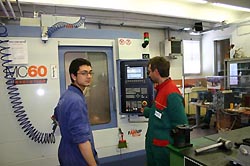

(ANS – Rome) – Within a year of being qualified, almost 70% of the young people leaving Salesian Vocational Training Centres (CFP), find work or continue their studies for a diploma. This is a comforting statistic at a time when in Italy the crisis and the shortage of jobs are hitting young people in particular, and is a measure of the vitality of Salesian training.
In greater detail, according to the statistics from a recent survey undertaken by the Institute of Sociology at the UPS, of 2,609 past pupils of the Salesian CFP in 2010, a year after qualifying 34,5% had found work and about the same number were continuing their studies.
At present there are about 25,000 young people taking Salesian Vocational Training courses – mainly three year courses – covering their period of compulsory education; and the demand would be even greater if the Institutes were not compelled to limit the enrolments for economic reasons.
The strong point of Salesian vocational training recognised also by outside observers and people in the world of work, is the dialogue with firms: recently there have been a series of agreements with important firms at national level (Fiat, Schneider, Siemens, Bosch…) and requests for even closer collaboration with the National Centre of Salesian Works-Formation Professional Updating (CNOS-FAP). This also means a constant increase in the level of technology in the centres and the possibility of being able to offer good opportunities for work experience to the youngsters during their training.
In collaboration with various partners each year there are National Competitions for Third Year students. Last year to celebrate the 150 anniversary of the Unification of Italy all the competitions were held in Turin. This year they will be spread around the country: Catania, Rome, Turin, Genoa, San Donà, Este… In all 200 young people will compete to produce “masterpieces” – as the competition title puts it – in various sectors: electronics, graphic design, hotel service, mechanics, auto-mechanics, information technology, window-framing, and in the areas of languages and culture and mathematics and science.
It will be an opportunity for all the vocational training students, who often come from a negative background in the usual more abstract school curriculum to demonstrate that there is also a “manual intelligence” of which they are the proof.
While the Congregation is busy coming to know and understand better Don Bosco in view of the bicentenary of his birth, the great contribution he made in the field of work and of the vocational training of his boys cannot be lost sight of. Some historical-critical background to this is available the writings of Josè Manuel Prellezo – recently appointed Director of the Salesian Historical Institute – published in the magazine “Rassegna CNOS” in three issues in 2009.
Published 29/02/2012
